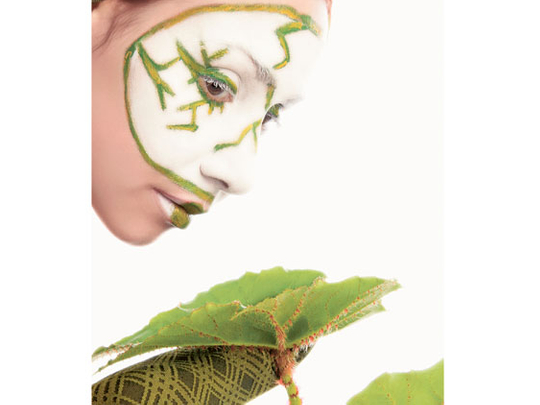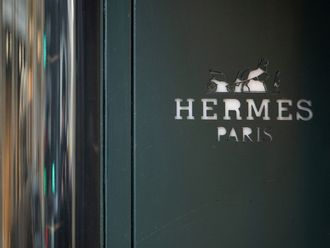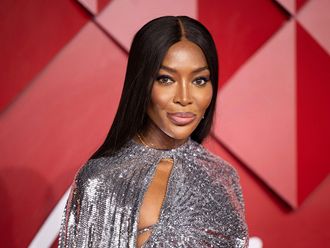
Granola crunchers. Birkenstocks paired with woolly sandals. Fuzzy, unkempt hair.
These are just a few of the stereotypes long associated with people who use organic and natural products. Well, times have changed. Organic and natural foods now occupy a permanent place on our grocery store shelves, right next to conventionally processed food. And now, beauty and skincare products are no different. You know what I'm talking about. They are everywhere.
When you walk into any shop selling your favourite beauty supplies, whether it's Boots, Sephora or even your favourite department store, there they are — organic and natural beauty products, those mysterious little bottles filled with promise.
And everyone seems to be cashing in. Even fashion designer Stella McCartney has done it with her very own line of products, Care. She says they are made with 100 per cent organic active ingredients, contain no petrochemicals or silicon and even follow strict vegetarian principles. But what is this phenomenon really about? Are petrochemicals, silicon and other things found in conventional beauty products really that bad for us?
Since thousands of us across the UAE are putting these products all over our faces and our bodies every single day — and sometimes again at night before we hit the town — I thought I'd better find out.
If you're confused by the whole natural versus organic thing, you're not alone. It seems that companies and products use these words interchangeably. But are they synonyms or are they actually two different things?
According to Natasha Bennett, operations manager at Dermalase Clinic in Dubai, it all comes down to understanding the ingredients used in the products. "Natural, as the name suggests, is where one, some or all of the ingredients used are unprocessed," she explained. "But it doesn't mean they were grown or gathered organically. Organic products, on the other hand, use ingredients produced without the use of antibiotics, synthetic hormones, genetic engineering, sewage sludge or irradiation, and are minimally processed without artificial ingredients or preservatives."
According to Lena Philippou, brand development director at the Greek company Korres, the natural beauty industry has blossomed over the past several years. We pay more attention to what goes on our skin and people are savvier than ever before.
"Working with natural and organic ingredients is extremely challenging, especially for those of us who selected this direction when the whole green/eco approach was far from the trend and most of the desired ingredients did not even exist in organic form," Philippou said.
Just under a year ago, after realising both the benefits and the demand for more natural skincare, Salina Handa, founder of Dubai's SensAsia Urban Spa, added Neom, an organic line of products to her range.
"The skin is the body's largest organ and is capable of absorbing up to 60 per cent of the substances we put on it, both good and bad," Handa said.
"Before we've even left the house, we can have applied up to 200 chemicals through moisturisers, cleansers and scrubs. By using organic products, we're ensuring that our skin is nourished with skin-friendly ingredients."
Because the Korres philosophy has been built on using the most natural formulae available, they are getting involved at the grass roots level, literally.
"We teach our partners organic farming and sustainable agricultural systems, help them through all stages of cultivation and harvesting in association with the Agricultural University of Athens, and support them financially by purchasing their produce to be used in our formulations," Philippou said.
There are also major environmental benefits to making and using organic or natural products. "All the bubbles and froth created by conventional cosmetics that eventually pollute our seas and waterways are eliminated [with the use of organic and natural products]," said Kate Kiesanowski of Organic Foods and Café in Dubai.
"Natural and organic cosmetics support social-responsibility projects such as the natural cultivation of raw materials according to bio-dynamic standards, no animal testing and use of renewable ingredients."
So it seems like there are some pretty good things about going organic or natural, right? Definitely. But don't be so quick to ditch your synthetic products.
To get the desired results from any product, whether it be organic, natural or synthetic, it is important for the consumer to understand his or her own skin, Bennett said.
"Regular use of non-organic cosmetics can strip away essential natural oils, further exposing the skin to harmful chemicals," Bennett said. "The skin needs to be looked after daily and it is also about having the right lifestyle — eat healthy, have sufficient water to stay hydrated."
But, she added, it's a good idea to consult a skin specialist or a dermatologist who can recommend a product based on your skin type, not just for what the bottle promises.
Not just for women
Women aren't the only ones trying to be more mindful of what they slather on their skin. "Any stigma associated with men taking care of themselves has gone," Handa said. "Men are more likely than ever before to visit a spa and spend money on products. The days of pilfering products from their wife's bathroom have gone."
Shop and save
Organic and natural products are often more expensive than synthetic products. I wanted to know if there are ways to shop for organic products while still being able to save. Turns out, there are. Luckily, the organic and natural market for cosmetics has seen the introduction of various brands, from economical options to high-end brands.
"In Dubai the organic and natural skincare selection is very good, with a range of brands to suit a variety of budgets, lifestyles and skin conditions and types," Kiesanowski said.
A few of the more expensive brands include Dr Perricone, Correct, Stella McCartney Care and Clinique lipsticks.
More budget-friendly brands found at Organic Foods and Café include Akin, Mi-essence, Weleda, Sante and Logona.
"If you are looking to make a gradual change, start with a natural lipstick. Most lipsticks have lead in them and given how often we re-apply lipstick throughout the day, it makes sense to start with the lips," Kiesanowski said. "If you don't wear lipstick, you could try introducing a natural night cream such as Akin. It is important to ensure that the ingredients are natural or organic as the cream will sit on the face for hours and be absorbed into the skin and eventually into the bloodstream."
Nab it!
Looking to give organic beauty a try? Here are some of the most popular products in the UAE.
Korres
- Wild Rose Cream. This was the brand's first cosmetic product launched in 1996 and also the first 24-hour moisturising face cream. A global bestseller, even 15 years after its launch.
- The Yoghurt Cooling Gel
- Quercetin and Oak anti-ageing and anti-wrinkle line. It is the first cosmetic worldwide based on a Nobel-awarded discovery and is the onlynatural alternative to retinol.
Neom
The Complete Bliss candle, which is made with Moroccan blush rose, has a soft scent and is the most popular from the line.
Organic Foods and Café
- Dr Hauschka Skin Care products
- A' kin, Hugo, Logona, Sante, Saaf, Akin, Mi-essence, Desert essence, Weleda and Eco branded products.
Where to shop
- Korres stores: The Dubai Mall, Mirdif City Centre
- Korres counters: Bloomingdale's Dubai, Areej MOE (select product range)Organic Foods and Café: Dubai Mall, Greens and Masdar City, Abu Dhabi
- Neom: SensAsia, on Palm Jumeirah, Village Mall and Emirates Golf Club












